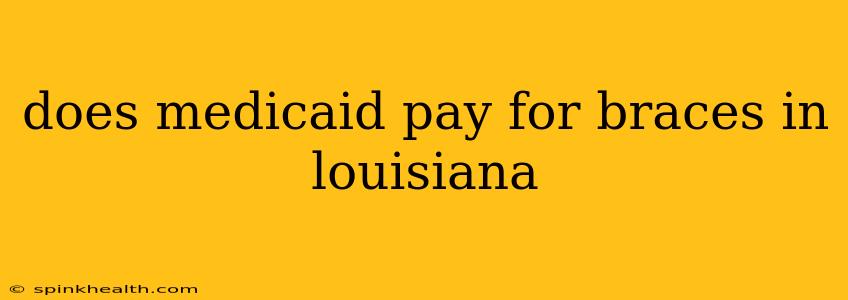The question of whether Medicaid covers braces in Louisiana is a common one, and the answer, unfortunately, isn't a simple yes or no. It's a journey filled with complexities, eligibility requirements, and varying interpretations of the program's guidelines. Let's unpack this together, exploring the intricacies of Louisiana's Medicaid program and its approach to orthodontic treatment.
Imagine Sarah, a bright, ambitious teenager in Baton Rouge. She dreams of a dazzling smile, but her family struggles financially. They rely on Louisiana Medicaid for healthcare, and the question of braces hangs heavy in the air. Can Medicaid help Sarah achieve her dream?
The short answer is: sometimes. Medicaid in Louisiana can cover orthodontic treatment, but only under very specific circumstances. It's not a guaranteed benefit, and several factors determine eligibility. Let's delve into the details.
What are the Eligibility Requirements for Medicaid Braces Coverage in Louisiana?
This is where things get intricate. Louisiana Medicaid's commitment to covering braces isn't absolute; it's highly dependent on the individual's specific medical necessity. Simply wanting straighter teeth isn't enough. The need for orthodontic treatment must be medically justified.
This generally means that the misalignment of teeth needs to be impacting the individual's overall health. Think:
- Severe malocclusion: This refers to a significant misalignment of the jaw and teeth that interferes with chewing, speaking, or even breathing.
- Skeletal abnormalities: Orthodontic treatment might be necessary to correct jaw misalignment or other skeletal issues impacting facial structure and overall oral health.
- TMJ disorders: If the misalignment is causing temporomandibular joint (TMJ) problems, this can also justify Medicaid coverage.
How Does Louisiana Medicaid Determine Medical Necessity for Braces?
The determination of medical necessity is crucial. It's not a decision made lightly; it involves thorough evaluations and documentation. Typically, a dentist or orthodontist will need to submit a detailed report outlining the medical reasons why braces are necessary for the patient's health. This report should include:
- Comprehensive dental records: Including x-rays and detailed descriptions of the malocclusion.
- Documentation of medical necessity: A clear and concise explanation of how the misalignment affects the patient's overall health and well-being.
- Treatment plan: A detailed outline of the proposed orthodontic treatment, including timelines and anticipated outcomes.
What if My Child Needs Braces for purely Cosmetic Reasons?
If the need for braces is purely cosmetic—for improving the appearance of the teeth without addressing underlying health concerns—Louisiana Medicaid is unlikely to cover the costs. This is a crucial distinction, and many families find themselves disappointed when they learn this. Focusing solely on aesthetics isn't enough to meet the medical necessity criteria.
Does Louisiana Medicaid Cover Adult Braces?
The likelihood of Medicaid covering braces for adults is even lower than for children. While theoretically possible in cases of severe medical necessity, it's exceptionally rare. The emphasis is generally placed on children and adolescents, as their jaw and facial structures are still developing.
What are the Specific Procedures Covered under Medicaid for Braces in Louisiana?
Medicaid's coverage isn't all-encompassing. While it might cover the cost of the braces themselves, it might not include all associated expenses, such as:
- Extractions: Teeth may need to be removed to make space for proper alignment.
- Retainers: These are essential for maintaining the results of orthodontic treatment after the braces are removed.
- Other related procedures: Depending on the case, additional procedures might be necessary, and Medicaid coverage for these is not guaranteed.
Where Can I Find More Information about Louisiana Medicaid's Coverage of Braces?
The best source of information is the Louisiana Department of Health's website, specifically the section pertaining to Medicaid services. You can also contact your local Medicaid office directly. They can provide specific details regarding eligibility and coverage based on your individual circumstances. Remember, navigating this process often requires persistence and proactive communication. Don't hesitate to seek clarification on any points that are unclear.
Sarah's journey, and the journey of many others in similar situations, highlights the need for clear understanding and proactive communication with Medicaid officials. While the path to orthodontic treatment through Medicaid in Louisiana might not always be straightforward, understanding the requirements and diligently pursuing the necessary documentation can significantly increase the chances of securing the necessary coverage.

